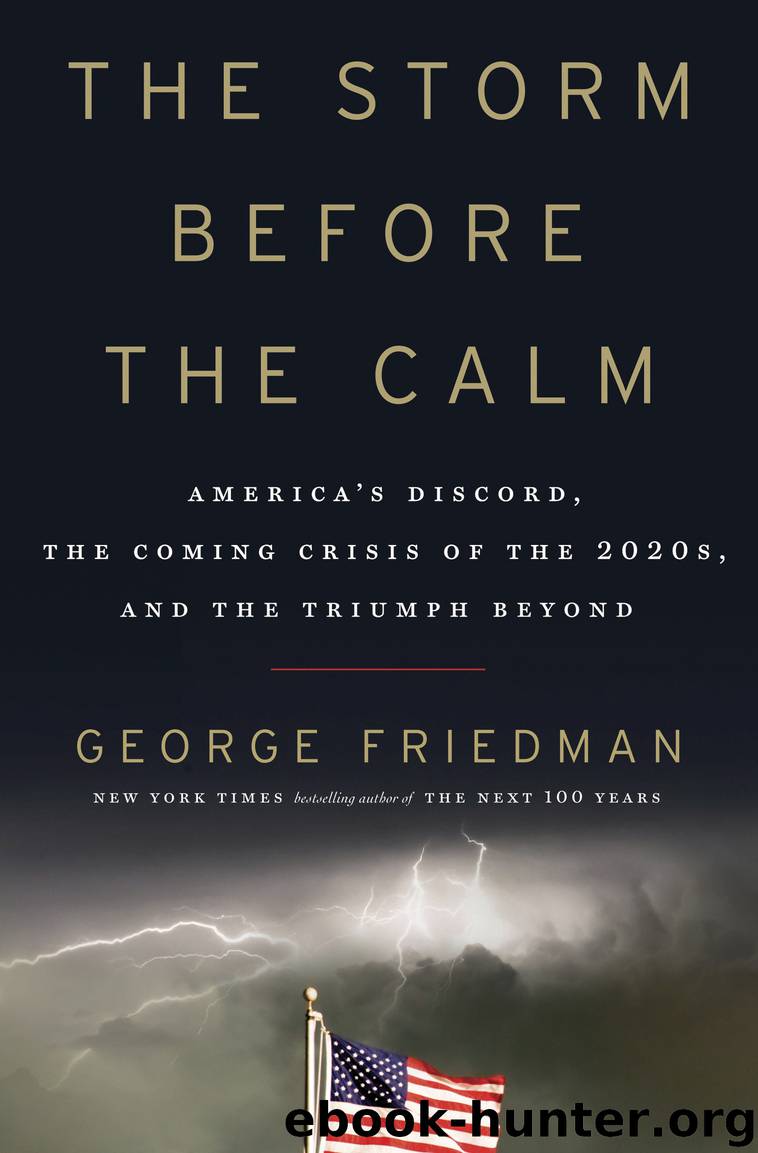The Storm Before the Calm by George Friedman

Author:George Friedman
Language: eng
Format: epub
Publisher: Knopf Doubleday Publishing Group
Published: 2020-02-24T16:00:00+00:00
The Second Socioeconomic Cycle: The Jackson Cycle, 1828–1876
Andrew Jackson did finally win the election of 1828, the first president from west of the Appalachians. This was the beginning of the process to construct the new cycle. It was the pivot point and not the end of the battle. And the battle was still focused on the banking system.
The Second Bank’s charter wasn’t due to expire until 1836, and Jackson did not yet have the political power to crush it. If 1828 was the pivot, the transition crisis began around 1819 and lasted until 1836, when the bank was finally dissolved after Jackson’s reelection. But until then, there were still economic tremors. Stable money, with stable credit, was needed for the settlement of the West. Jackson supported the call for a dollar backed by both gold and silver. Gold was stable but limited the money supply. Silver was less rare and therefore built expansion into the currency. By linking the dollar to both metals, Jackson hoped to create sufficient liquidity without causing bubbles.
That was in the long run. In the short run, this created the panic of 1837, and the stabilization of the currency resulted in a banking crisis in the United States. This wasn’t the only cause of the crisis. The wheat crop in the United States failed in the same year, and there was a massive financial crisis in Britain that affected the United States as well. This does point out two things. First, the actions required to adjust to a new cycle frequently cause economic pain, particularly to those who did not anticipate the changes, believing the old cycle to be eternal. Second, nearly a decade after the presidential shift, the transition was still under way.
Given the importance of the Civil War, it would seem reasonable to assume that it was a turning point in American history. From an institutional point, it certainly was. From the standpoint of economics, there was a great deal of commonality on both sides of the Civil War. Lincoln was a westerner, born in Kentucky and settled in Illinois. He championed the interests of the Union against the South, but he also championed western settlers. He signed the Homestead Act in 1862, which gave 160 acres of federal land in the West to anyone who would farm it for five years. This opened the door to greater settlement of the West and also undermined land speculation by locking in ownership for five years and bringing large amounts of new land to the market.
In this, Lincoln was clearly part of the Jackson cycle. Given his towering importance in American history, it is odd that he would not be a social and economic pivot. However, Lincoln’s importance was in the massive institutional shift that took place after the Civil War. From a social and political standpoint, he governed within the framework of Jackson’s cycle, settling the land and making it productive. However, he governed toward the end of the cycle in which Grant was the failed president.
Download
This site does not store any files on its server. We only index and link to content provided by other sites. Please contact the content providers to delete copyright contents if any and email us, we'll remove relevant links or contents immediately.
| Anarchism | Communism & Socialism |
| Conservatism & Liberalism | Democracy |
| Fascism | Libertarianism |
| Nationalism | Radicalism |
| Utopian |
The Secret History by Donna Tartt(19089)
The Social Justice Warrior Handbook by Lisa De Pasquale(12190)
Thirteen Reasons Why by Jay Asher(8910)
This Is How You Lose Her by Junot Diaz(6887)
Weapons of Math Destruction by Cathy O'Neil(6281)
Zero to One by Peter Thiel(5802)
Beartown by Fredrik Backman(5754)
The Myth of the Strong Leader by Archie Brown(5508)
The Fire Next Time by James Baldwin(5446)
How Democracies Die by Steven Levitsky & Daniel Ziblatt(5219)
Promise Me, Dad by Joe Biden(5153)
Stone's Rules by Roger Stone(5088)
A Higher Loyalty: Truth, Lies, and Leadership by James Comey(4964)
100 Deadly Skills by Clint Emerson(4925)
Rise and Kill First by Ronen Bergman(4789)
Secrecy World by Jake Bernstein(4753)
The David Icke Guide to the Global Conspiracy (and how to end it) by David Icke(4720)
The Farm by Tom Rob Smith(4513)
The Doomsday Machine by Daniel Ellsberg(4490)
